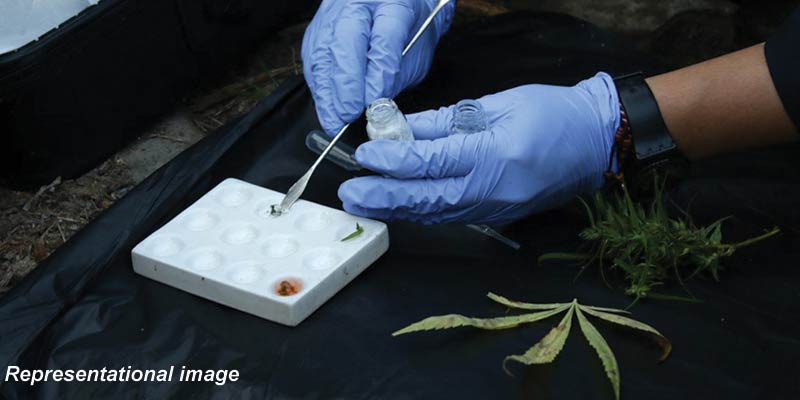- World
- Mar 05
Rapid expansion of synthetic drugs reshaping illicit markets
• Synthetic drugs are rapidly transforming the global drug trade, fuelling an escalating public health crisis, according to the annual report of the UN administered International Narcotics Control Board (INCB).
• Demand for synthetic drugs has sharply risen, alongside prescription opioid dependence and the falsified pharmaceutical drugs that have entered illicit markets.
• Dependence and misuse of synthetic drugs have quickly become a deadly problem, with hundreds of thousands of overdose fatalities each year as criminal actors have made synthetic drugs more potent and have incorporated new, unknown substances that are difficult to routinely test and identify.
• With large numbers of fatal overdoses every year, synthetic substances are stronger in their potency and the duration of action than the plant-based drugs they mimic and demand for them is rising.
• Synthetic drugs are easily manufactured and trafficked with little technical or scientific knowledge needed and there is a reduced need for labour or land for cultivation unlike for plant-based drugs.
• Planting, harvesting, drying, milling and threshing processes for plant-based drugs require extensive acreage and human resources and are vulnerable to weather conditions, satellite detection and forced eradication.
Meanwhile, expanded access to online scientific literature and manufacturing materials, such as tablet presses, has further supported the ability of individuals to manufacture synthetic drugs efficiently.
• The manufacture can be located anywhere and the same equipment can be used for different synthetic outputs.
• Traffickers can shift manufacture, movement and marketing tactics to keep operating costs down and profit margins up as well as to reduce risks of interdiction.
• As synthetic drugs are more potent, traffickers can send smaller consignments which are easier to conceal and sometimes use drones and other new trafficking techniques.
• Although global demand for plant-based drugs is still higher than the current supply of synthetic drugs, seizures of synthetic substances have already begun to outpace seizures of some plant-based drugs.
• The rise of powerful opioids like fentanyl and nitazenes – potent enough to cause overdoses in tiny doses – has worsened the crisis, driving record-high deaths.
Traffickers stay ahead of regulations
• Criminal groups are constantly adapting to evade law enforcement.
• By exploiting legal loopholes, they develop new synthetic compounds and use artificial intelligence to find alternative chemicals for drug production.
• New smuggling methods — including drones and postal deliveries — make these drugs harder to detect.
• As a result, seizures of synthetic substances are now outpacing those of traditional plant-based drugs like heroin and cocaine.
• Despite efforts to curb synthetic drugs, responses remain fragmented, allowing traffickers to stay ahead.
• The INCB is calling for stronger global cooperation, including partnerships between governments, private companies and international organisations, to disrupt supply chains and prevent harm.
Regional hotspots concerns
• The report identifies several regions where synthetic drug trafficking is expanding.
• In Europe, the looming heroin deficit following Afghanistan’s 2022 opium ban could push more users toward synthetic alternatives while in North America, despite efforts to curb the crisis, synthetic opioid-related deaths remain at record highs.
• The manufacture, trafficking and use of amphetamine-type stimulants are increasing across the Middle East and Africa, where treatment and rehabilitation services are often inadequate.
• Meanwhile, in the Asia-Pacific region, methamphetamine and ketamine trafficking continues to grow, particularly in the Golden Triangle.
International Narcotics Control Board (INCB)
• The International Narcotics Control Board (INCB) is the independent and quasi-judicial monitoring body for the implementation of the United Nations international drug control conventions.
• It was established in 1968 in accordance with the Single Convention on Narcotic Drugs, 1961.
The functions of INCB are laid down in the following treaties:
a) The Single Convention on Narcotic Drugs, 1961
b) The Convention on Psychotropic Substances of 1971.
c) The United Nations Convention against Illicit Traffic in Narcotic Drugs and Psychotropic Substances of 1988.
• INCB consists of 13 members who are elected by the Economic and Social Council and who serve in their personal capacity, not as government representatives.
• INCB has a secretariat in Vienna that assists it in the exercise of its treaty-related functions.
• The INCB secretariat is an administrative entity of UNODC, but it reports solely to the Board on matters of substance.
• INCB closely collaborates with UNODC in the framework of arrangements approved by the Council.
• INCB also cooperates with other international bodies concerned with drug control, including not only the Council and its Commission on Narcotic Drugs, but also the relevant specialised agencies of the United Nations, particularly WHO. It also cooperates with bodies outside the United Nations system, especially Interpol and World Customs Organisation.
Manorama Yearbook app is now available on Google Play Store and iOS App Store


